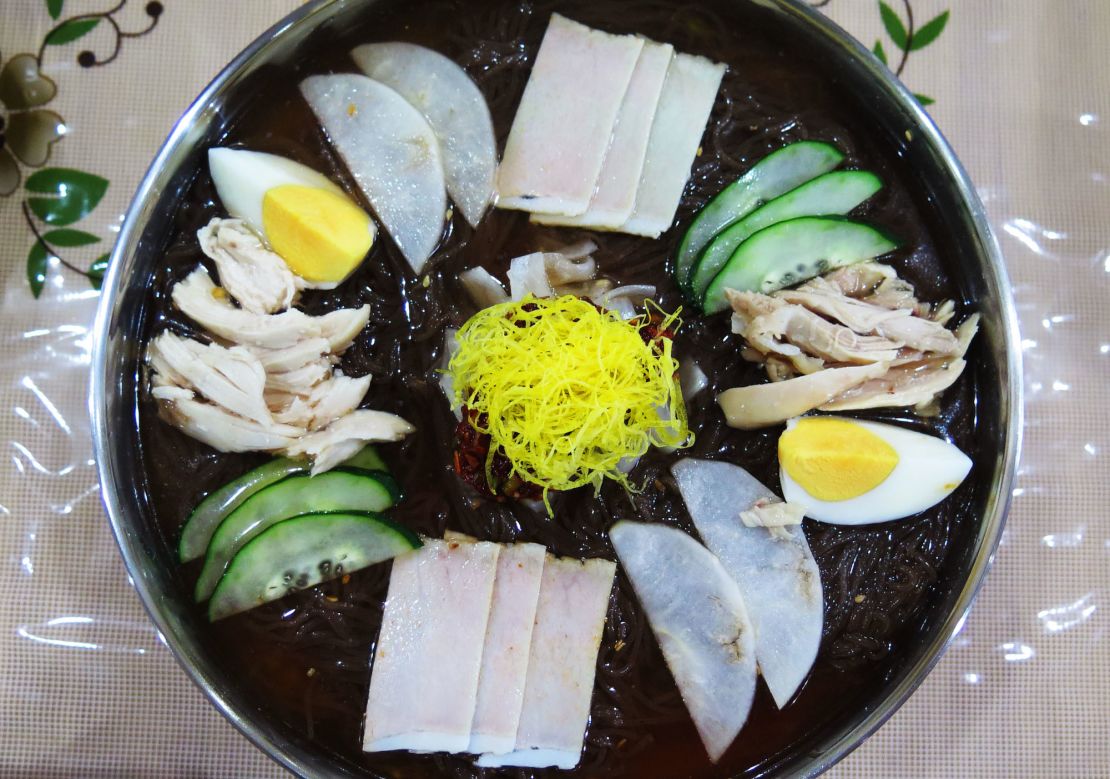In Bangkok, there’s a restaurant where North Korean women strip diners of their freedom to take photographs. The same women cheerfully scissor noodles at tables, but seem subject to sudden mood swings.
Meanwhile, armed troops and gleeful singers perform in the background, navigating the fine line between entertainment and brainwashing.
This is the Pyongyang Okryu Restaurant, one of a chain of eateries operated around the world by the North Korean regime that offer a weird glimpse of life inside the hermetic Stalinist nation.
The chain was recently cast into the spotlight when a group of North Korean restaurant workers reportedly defected to South Korea.
Upon entering the restaurant, polka dot-clad waitresses greet customers with shy smiles and tender hand waves.
However, as observed during a recent visit, they may suddenly appear panic-stricken, drained of emotions or severely displeased when guests stray from the menu.
The food?
Diners can enjoy a tasty but somewhat oily and salty meal at a plastic-covered table amid the restaurant’s permanent Christmas decorations.
‘No photos!’
Those aware of life in North Korea may feel like they’ve passed through an invisible membrane into the country upon entering this restaurant, located on Bangkok’s trendy, upmarket Ekamai Road.
That’s because this clean, modern eatery offers a window onto the tense and rarefied life of those near the top of North Korea’s brutal hierarchy.
For example, while most citizens in the northeast Asian nation reportedly suffer in an Orwellian dystopia, here inside Pyongyang Okryu Restaurant the workers are not suffering in poverty.
Instead, their problem appears to be how not to die of boredom while a big digital screen blares DVDs of North Koreans singing robust patriotic songs amid troops marching, weapons rolling in parades and regime officials applauding.
During our visit, three servers near the front door watched the DVDs, slowly swaying and softly singing the lyrics.
The restaurant was empty during the recent mid-week evening when this writer – posing as a tourist – was the only customer in the 100-seat restaurant.
The staff speaks modestly good English, but inquiries about the restaurant or North Korea were met with a chorus of “I don’t know.”
Photographing the food was OK for a while, but that freedom was abruptly withdrawn, with strident “no photos!” commands.
Writing on a blank sheet of paper also raised the alarm.
“What are you doing? What are you doing?,” a waitress demanded, requiring a full explanation.

The menu
So, what’s on the menu?
There’s the 150 baht ($4.25) fried mackerel and scallions, wrapped in aluminum foil, graciously deboned by a waitress at your table.
Even better is the 350 baht “Pyongyang tray cold noodle.”
Large enough for two people, it includes slices of chicken, cucumber, a hard-boiled egg, red chilies, vinegar and mustard – all topping spaghetti-like rice noodles, which a waitress will cut with big pink scissors.
Mung Bean Jijim comes in the form of four flat, thin, green, circular pancakes wet with oil, adorned with parsley and tasting like potatoes.
Beer and other drinks are also available along with fish, pork, beef, chicken, vegetable, noodle and soup dishes.
Lunch specials are 99 baht a plate and include dumplings, noodles, Kimchi Udong, Bibimbab Haeju and fried rice with chicken.
Several miles away, a flashier Pyongyang A Ri Rang Restaurant on soi (alley) 26 of Bangkok’s Sukhumvit Road also offers food, but with the added fun of karaoke and a live floor show.
However, during a recent visit, a sign said it was closed for renovations.
Beyond Bangkok, Pyongyang’s regime also operates restaurants in Malaysia, Laos, Cambodia, Nepal and across China, plus the Middle East and Africa.
Pyongyang Okryu Restaurant, 72 Sukhumvit 63 (Ekamai), between Ekamai soi 4 and 6; +66 (0)2 020 0220
Richard S. Ehrlich is a freelance writer from San Francisco. He’s reported for international media from Asia since 1978, based in Hong Kong, New Delhi and now Bangkok.










